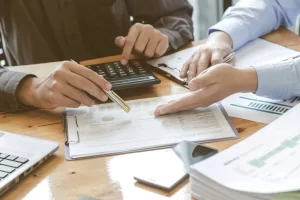Common reasons behind non-payments
There are a number of reasons that can lead a customer or company to default on an invoice. Some of the most common include:In the business environment, facing non-payment of invoices is a reality that can destabilise the economy of any business. The management of non-payments for companies therefore becomes an essential task to ensure the solvency and smooth running of the company. At Ignacio García Taboada Law Firm, we know first-hand the importance of protecting the company from unpaid invoices and of having effective strategies for the collection of unpaid invoices.
Throughout this article, we will offer you a complete guide on how to deal with and prevent unpaid invoices, how to collect an unpaid invoice and what to do if an invoice is not paid.
Understanding the problem of unpaid invoices
Non-payment of invoices is a reality that many businesses face on a regular basis. This situation, beyond being a simple inconvenience, can have significant repercussions on the financial and operational health of any business.
What is a non-payment and when is it considered as such?
A default of payment refers to the failure to pay an invoice or debt within the time period agreed between the parties.
Invoices are considered non-payment when, after the stipulated deadline for payment has expired, payment has not been made.
It is important to differentiate between late payment and non-payment. While late payment may be temporary and resolved in a short period of time, non-payment is a more protracted situation and may require legal action, such as a claim for payment of the invoice, to resolve.
- Liquidity problems or insolvency of the debtor.
- Disagreements or disputes over the service or product invoiced.
- Administrative errors or errors in the issuing of the invoice.
- Lack of adequate follow-up by the creditor in the invoice collection process.
- Unforeseen situations such as economic crises or force majeure events.
Economic and operational consequences of non-payment
Non-payment of invoices can have various consequences for a company:
- Financial impact: Lack of revenue can affect the company’s liquidity and ability to meet its own obligations.
- Additional costs: Actions to collect unpaid invoices, such as collection procedures or debt insurance, can generate additional costs.
- Business relationships: Unpaid invoices can create tensions and deteriorate relationships with customers or suppliers.
- Reputation: A high rate of unpaid invoices can affect the company’s image and reputation in the market.
- Operational: Lack of resources can limit the company’s operational and investment capacity.
The importance of effective revenue management
In business, ensuring a steady flow of revenue is important to maintain optimal financial health. A key part of this process is invoice collection management.
Why good collection management can prevent non-payments
Effective collection management not only ensures that invoices are paid on time, but can also prevent situations of non-payment of invoices:
- Early identification of problems: By being aware of every invoice issued and its status, it is possible to quickly detect disagreements or discrepancies which, if addressed in time, can prevent non-payments.
- Clear communication with customers: Open dialogue about payment terms and deadlines, as well as timely reminders, can encourage timely payment and reduce the chances of an invoice remaining unpaid.
- Constant follow-up: Monitoring outstanding invoices and regular follow-ups increases the chances of collecting unpaid invoices before they become a major problem.
- Flexibility in terms: Offering payment options tailored to customers’ needs can be an incentive for them to meet their obligations on time.
- Tools and insurance: Using management tools and considering invoice collection insurance can be an effective preventive strategy against non-payment.
- Clarity on legal actions: Informing customers about the possible legal consequences of non-payment, such as a claim for payment, can act as a deterrent.
Preventive strategies: minimising risk at the outset
The best way to deal with unpaid invoices is to prevent them from the outset. Implementing preventive strategies can make the difference between successful collection management and facing unpaid invoices.
Research and analysis of new customers
Before establishing a business relationship, it is very important to spend time researching and analysing new customers. This will allow you to:
- Know their credit and financial history.
- Identify whether they have had unpaid invoices in the past.
- Establish payment terms according to their financial capacity and behaviour.
- Performing this prior analysis will ensure a healthy business relationship.
Setting clear terms and conditions in contracts and invoices
One of the most common reasons behind non-payment is a lack of clarity in terms and conditions. So take the time to carry out these points:
- Clearly define payment terms on invoices.
- Establish penalties for late or non-payment.
- Detail the procedure for collecting invoices in the event of non-payment.
Establishing clear terms from the outset can act as a deterrent and ensure that invoices are collected on time.
Use of credit insurance and how much can be insured
Credit insurance, also known as debt default insurance or invoice collection insurance, is a valuable tool for businesses. These insurances:
- They protect the company against possible non-payment of invoices.
- They allow a percentage of the amount owed to be recovered in the event of non-payment.
- They offer peace of mind by insuring a portion of the company’s capital.
It is important to research and choose a credit insurance policy that suits your company’s needs and know how much you can insure, to maximise protection against non-payment.
Proactive tools and tactics for securing collections
When it comes to securing invoice collection, there are a number of tools and tactics that, when implemented proactively, can significantly increase the chances of collecting unpaid invoices and minimise the risks associated with non-payment.
Timely invoicing and constant monitoring
Timely invoicing and constant monitoring ensure the collection of invoices. On the one hand, issuing invoices in a timely manner ensures that the customer is informed about their payment obligations, while constant monitoring allows any delays or discrepancies to be quickly identified, making it easier for businesses to manage non-payments.
Sending payment reminders and their importance
Payment reminders are good tools to prevent non-payment:
- A reminder before an invoice is due can encourage timely payment.
- In case of overdue invoices, sending reminders can increase the likelihood of collecting unpaid invoices.
- These reminders also reinforce the seriousness and professionalism of the company in terms of invoice collection.
Effective customer communication
Maintaining open and effective communication is key to managing and preventing unpaid invoices. This can be achieved through these actions:
- Resolving doubts or disagreements about unpaid invoices in a timely manner.
- Establish a direct communication channel to address issues related to invoice collection.
- Informing the customer about the deadline for claiming unpaid invoices and the possible consequences of not doing so.
Offering flexible payment options
Offering flexibility in payment terms can also be a good strategy to ensure collection:
- Installment payment plans or financing for customers with temporary difficulties.
- Discounts for early payment or cash.
- Accept different payment methods, such as transfers, credit cards or online payment platforms.
How to deal with a payment default
Facing non-payment is a situation that no business wants, but it is a reality that can happen. The key is how you handle the situation. Acting quickly and strategically can make the difference between recovering money or facing financial loss.
Negotiations and payment agreements
In the event of non-payment, the first step is to attempt direct negotiation with the customer. Open and sympathetic communication should be maintained, seeking to understand the reasons behind the non-payment. In many cases, the customer may be experiencing temporary difficulties and be willing to reach an agreement. Establishing a payment plan adapted to the customer’s situation, such as instalment payments or extensions of deadlines, can be a mutually beneficial solution. However, it is essential that any agreement reached is put in writing, specifying the terms and conditions of the new payment plan.
Use of debt collection services
If negotiations do not work and non-payment persists, it may be time to consider using specialised debt collection services. These agencies have specific expertise and tools to manage the collection of unpaid invoices. In addition, their intervention often has a deterrent effect on debtors, increasing the chances of recovering the money. If you choose this option, it is important to choose a collection agency with a good reputation and that acts within the legal framework.
Legal action in case of persistent non-payment
If non-payment continues and an agreement cannot be reached, legal action may be necessary. Depending on the amount and the circumstances, mediation proceedings, an order for payment procedure or, in more serious cases, a civil lawsuit may be the option.
In this case, it is very important to seek the advice of a lawyer specialised in debt collection to ensure that the right steps are taken and the chances of success are maximised.
ASNEF file and other databases of unpaid debts
Including a debtor in files such as ASNEF or other databases of unpaid debts is a measure that can exert pressure on the client to regularise his situation. These files collect information on unpaid debts and may affect the debtor’s ability to obtain financing or credit in the future. However, current regulations must be followed and the debtor must be notified before being included in these registers.
Technological tools and solutions to the rescue
Today, companies have a wide range of technological tools and solutions designed to optimise and facilitate the management of non-payments. These tools not only allow for more efficient tracking of outstanding invoices, but also offer resources to prevent and act on potential non-payments.
Accounts receivable management software
Accounts receivable management software are systems designed to automate and optimise the invoice collection process. These tools allow you to:
- Record and monitor all invoices issued, quickly identifying those that are outstanding or past the deadline for claiming unpaid invoices.
- Automate the sending of payment reminders, reducing the time and effort invested in following up on overdue invoices.
- Generate detailed reports on the status of accounts receivable, facilitating decision-making and financial planning.
Credit verification platforms
Before establishing business relationships with new customers you need to know their creditworthiness and credit history. Credit checking platforms allow you to:
- Access detailed information about a customer’s or company’s financial history, identifying potential risks associated with non-payment of past invoices.
- Establish appropriate payment terms based on the customer’s creditworthiness, minimising the risk of facing unpaid invoices in the future.
Financial monitoring and alerting services
Being informed in real time about the financial situation of customers helps to prevent defaults. Financial monitoring and alert services offer:
- Real-time notifications about changes in clients’ financial situation, such as the appearance of unpaid debts or changes in their solvency.
- Analysis and monitoring tools to anticipate potential defaults and take preventive measures, such as adjusting payment terms or intensifying the follow-up of outstanding invoices.
Additional tips to strengthen your company’s protection
To conclude this advanced guide on how to avoid non-payment of invoices, we recommend that you bear these points in mind:
Collect in advance and payment facilities.
One of the most effective strategies to avoid non-payment of invoices is to collect in advance, at least a part of the total amount. This not only guarantees an inflow of capital from the outset, but also reduces the risk of unpaid invoices.
In addition, offering payment facilities, such as early payment discounts or financing, can incentivise customers to meet their financial obligations on time. It is also advisable to consider the option of collecting overdue invoices through flexible arrangements with the customer.
Use of prevention seals and certifications
Having prevention seals and certifications can act as a deterrent against possible non-payment. These seals indicate that the company has procedures in place for the collection of invoices and the management of unpaid debts. They also convey confidence and professionalism, which can encourage customers to avoid late payments.
Send invoices on time
Efficient management also means sending invoices in a timely manner.Delays in issuing invoices can lead to confusion and disorganisation, increasing the risk of non-payment. You must have a system in place that allows you to collect an unpaid invoice efficiently and on time.
In addition, it is important to inform the customer about the deadline for claiming an unpaid invoice, so that they are aware of their obligations and the consequences of non-compliance.
Conclusions
Dealing with unpaid invoices and managing debts can be a complex and challenging process. However, you are not alone in this task. At Ignacio García Taboada Law Firm we have the experience and knowledge necessary to advise and guide you through every step of the process. If you are looking to protect your company and ensure sound financial management, do not hesitate to contact us. We offer you personalised solutions and a professional service so you can focus on what you do best: growing your business. Contact us today and find out how we can help you!





